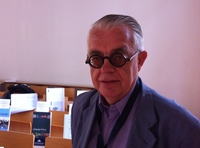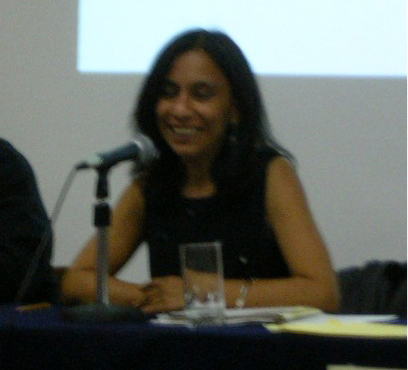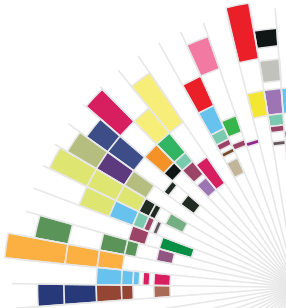INSTRUCTORS (Click to see their biography)
Felix AMEKA (Leiden University Centre for Linguistics, Leiden, Holland Consortium 3L)
 | Felix Ameka is a Lecturer at the Leiden University Centre for Linguistics (Netherlands). He specialises on the Kwa language family (particularly Ewe) spoken in West Africa. Apart from the description and documentation of languages, he is interested in the cultural, cognitive and human social interactional motivations of grammar and how speakers use grammar.
Contact |
|
Michel BERT (Dynamique Du Langage (DDL), Université de Lyon, Lyon, France Consortium 3L)
 | Michel Bert is a Lecturer at the University Lumière – Lyon 2 and a Researcher at the DDL laboratory. He has conducted extensive fieldwork in dialectology and sociolinguistics on both Francoprovençal and Occitan in the Rhône-Alpes region. He directed the FOR A sociolinguistic Study on Francoprovençal and Occitan in Rhône-Alpes and co-edited (with Colette Grinevald ) the volume Linguistique de Terrain sur Langues en Danger: Locuteurs et Linguistes (2010).
Contact |
|
James COSTA (Laboratoire Icar, Institut français de l'éducation, ENS de Lyon, France)
 | James Costa is a Researcher at the Institut français de l’éducation (Ecole Normale Supérieure de Lyon) / ICAR Laboratory in Lyon. He has conducted critical sociolinguistic fieldwork on the revitalisation of Scots (in Scotland) and Occitan (in Provence), and in 2010 he defended a thesis entitled Language Revitalisation: Discourses, Myths and Ideologies. He is currently analysing issues of ideologies of revitalisation in Europe and beyond.
Contact |
|
 | Alexandre Duchêne is the Director of the Institute of Multilingualism (University of Fribourg / Haute Ecole Pédagogique, Fribourg, Switzerland). He is one of the leading academics in critical sociolinguistics and has co-edited (with Monica Heller ) the volume Discourses of Endangerment (2007). He has also published Ideologies Across Nations (2008), an account of how linguistic minorities were constituted as a category at the United Nations.
Contact |
|
Jane FREELAND (Associate Researcher of Univ. of Southampton, Centre for Transnational Studies, UK)
 | Jane Freeland is a Sociolinguist with interests in ideologies and revitalization. She co-edited with Donna Patrick Language Rights and Language Survival - Sociolinguistic and Sociocultural Approaches (2004).
Her most recent fieldwork has been in facilitating a community diploma in sociolinguistics and the revitalization of Mayangna in Nicaragua.
Contact |
|
 | Médéric Gasquet-Cyrus is a Lecturer at Aix-Marseille University and a Researcher at the Laboratoire Parole et Langage. He has worked extensively on several aspects of the Provençal context, and is currently conducting linguistic and sociolinguistic fieldwork in the Alps at the border between Occitan and Francoprovençal. He is the co-editor (with Cécile Petitjean) of Le Poids des Langues: Dynamiques, Représentations, Contacts, Conflits (2009).
Contact |
|
Carol GENETTI (CTLDC, University of California, Santa Barbara, USA)
 | Carol Genetti is a Professor at the Department of Linguistics at the University of California, Santa Barbara. Her primary research interests are Himalayan languages, language documentation, phonology, syntax, language change, and historical linguistics. Most of her research has focused on Newar, a Tibeto-Burman language spoken in Nepal. Most recently she has published a comprehensive reference grammar of the Dolakha dialect. She is also the editor of Himalayan Linguistics and the founder and current Co-Convener of the Consortium on Training in Language Documentation and Conservation (CTLDC), a new international organization seeking to extend the scope and effectiveness of training programs for speakers of endangered languages and those interested in supporting them.
Contact |
|
 | Lenore Grenoble is a Professor in the Department of Slavic Languages at the University of Chicago. She is interested in Slavic, Tungusic and languages of the North, discourse analysis, contact linguistics and language endangerment, attrition, and revitalization. Her fieldwork focuses on languages of Siberia and she is currently engaged in research on the interrelations between language, culture and environment in the North. She is the co-editor (with L. Whaley) of Endangered Languages: Language Loss and Community Responses (1998) and the co-author (with L. Whaley) of Saving Languages: An Introduction to Language Revitalization (2006).
Contact |
|
Colette GRINEVALD (Dynamique Du Langage (DDL), Université de Lyon, Lyon, France Consortium 3L)
 | Colette Grinevald is a Professor at the Université Lumière – Lyon 2, a Researcher at the DDL Laboratory in Lyon, and co-director with Michel Bert of its research program LED TDR. She was previously a Professor at the University of Oregon (under the name of Craig). She is a specialist of the description of Latin American languages, and has done extensive fieldwork on languages of Central America (Mayan languages of Guatemala and Rama of Nicaragua). She has been coordinating for over twenty years the Rama Language Project of Nicaragua, which has been one of her main sources of inspiration and maturation on issues of endangered languages, with a focus on fieldwork issues and the role of linguists in the back and forth between academia and field. She recently co-edited (with Michel Bert) the volume Linguistique de Terrain sur Langues en Danger: Locuteurs et Linguistes (2010).
Contact |
|
Mari JONES (University of Cambridge, Cambridge, UK)
 | Mari Jones is a Reader in French linguistics at the University of Cambridge and a Fellow of Peterhouse, Cambridge. She Mari Jones specialises in French linguistics, especially language death theory and dialectology. She is interested in all aspects of language change, dialectology, language contact and questions of standardisation. Her research has focused particularly on Welsh, Breton and - at present - the French of the Channel Islands (Jèrriais, Guernesiais, Sercquais). She has published many authoritative books on language death and revitalisation, including Language Obsolescence and Revitalization (1998); La langue bretonne aujourd'hui à Plougastel-Daoulas (1998) and Jersey Norman French: A linguistic Study of an obsolescent dialect (2001).
Contact |
|
 | Jean-Baptiste Martin is a Emeritus Professor at the DDL Laboratory in Lyon. He has devoted his entire career to documenting Northern Occitan and Francoprovençal in the Rhône-Alpes Region. He is now the Scientific Advisor for the regional language policy board of the local government in Rhône-Alpes, and the General Editor of a series of publications in and on Occitan and Francoprovençal with EMCE, a publisher based in Lyon. He has recently edited the volume Poésies et Contes de Savoie (2012).
Contact |
|
 | Salikoko Mufwene is a Professor in the Department of Linguistics at the University of Chicago. His research of the past twenty years has been primarily on morphosyntactic and semantic characteristics of Gullah, African-American Vernacular English, Jamaican Creole, and English. In recent years he has focused more on the development of "Atlantic creoles" (lexified by European languages), Kikongo-Kituba, Lingala, and on questions of language evolution. He has also written on language death and revitalisation, and he has developed an ecological approach to processes of language evolution. He is the author of The Ecology of Language Evolution (2001), Language Evolution: Contact, Competition and Change (2008) and the co-editor (with Cécile Vigouroux) of Globalization and Language Vitality: Perspectives from Africa (2008).
Contact |
|
 | David Nathan is the Director of the Endangered Languages Archive at the School of African and Oriental Languages (SOAS) in London. He has worked for nearly twenty years with computing applications for endangered languages, especially Australian Aboriginal languages. He has also developed software for language research, publication, and education. Currently he is absorbed in the development of the Endangered Languages Archive, its close connections to issues in language documentation, language support and education, and linguistic research, and how these connections can be supported through innovative web technologies.
Contact |
|
 | Soledad Pérez-López is a Professor of Education at the Universidad Pedagógica Nacional in Mexico City. She specialises on the didactics of Mexican indigenous languages, and in 2005 she started a project on that subject which aimed at producing material for the training of professionals working in bilingual education in Mexico.
Contact - E-mail |
|
|
|
Julia SALLABANK (School of Oriental and African Studies, Londres, Royaume-Uni, Consortium 3L)
 | Julia Sallabank is a Lecturer at the School of African and Oriental Studies in London. Her main research interests are language revitalisation, language policy and planning, mainly from a sociolinguistic perspective. She is particularly interested in the 'intellectualisation' of the field of language revitalisation, which she believes is under-theorised. Since 2000 she has been working with an endangered language community in Guernsey (Channel Islands), on which she has published extensively. She has recently co-edited (with Peter Austin) the Cambridge Handbook of Endangered Languages (2011).
Contact |
|
 | Lolke van der Veen is a Professor at the Université Lumière – Lyon 2, and a Researcher at the DDL Laboratory in Lyon. He has specialised on the endangered languages of Africa and in the linguistics and linguistic anthropology of Gabon in West Africa.
Contact |
|
SCIENTIFIC BOARD - 3L Consortium
- Colette Grinevald, Michel Bert, Jean-Baptiste Martin - Dynamique Du Langage, Université de Lyon, Lyon, France
- James Costa - Interactions, Corpus, Apprentissages, Représentations, Université de Lyon, Lyon, France
- Peter Austin, Julia Sallabank, David Nathan - School of Oriental and African Studies, Londres, Royaume-Uni
- Felix Ameka - Leiden University Centre for Linguistics, Leiden, Pays-Bas
|
ORGANISATION BOARD
- Michel Bert, Linda Brendlin, James Costa, Colette Grinevald, Jean-Baptiste Martin, Pascale Paulin, Bénédicte Pivot
- Webmaster : Leandro Di Domenico
|
Last update02/20/2013 15:05-> .
|






























